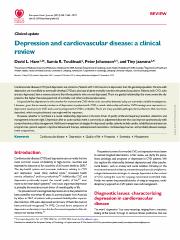Please use this identifier to cite or link to this item:
https://ahro.austin.org.au/austinjspui/handle/1/11968| Title: | Depression and cardiovascular disease: a clinical review. | Austin Authors: | Hare, David L ;Toukhsati, Samia R ;Johansson, Peter;Jaarsma, Tiny | Affiliation: | Department of Cardiology, Austin Health, Heidelberg Vic 3084, Australia Department of Medicine, University of Melbourne, Heidelberg Vic 3084, Australia Department of Cardiology, Austin Health, Heidelberg Vic 3084, Australia Department of Health and Welfare Studies, Faculty of Health Sciences, University of Link??ping, Sweden Department of Cardiology, Link??ping University Hospital, S-58185 Link??ping, Sweden. |
Issue Date: | 25-Nov-2013 | Publication information: | European Heart Journal 2013; 35(21): 1365-72 | Abstract: | Cardiovascular disease (CVD) and depression are common. Patients with CVD have more depression than the general population. Persons with depression are more likely to eventually develop CVD and also have a higher mortality rate than the general population. Patients with CVD, who are also depressed, have a worse outcome than those patients who are not depressed. There is a graded relationship: the more severe the depression, the higher the subsequent risk of mortality and other cardiovascular events. It is possible that depression is only a marker for more severe CVD which so far cannot be detected using our currently available investigations. However, given the increased prevalence of depression in patients with CVD, a causal relationship with either CVD causing more depression or depression causing more CVD and a worse prognosis for CVD is probable. There are many possible pathogenetic mechanisms that have been described, which are plausible and that might well be important. However, whether or not there is a causal relationship, depression is the main driver of quality of life and requires prevention, detection, and management in its own right. Depression after an acute cardiac event is commonly an adjustment disorder than can improve spontaneously with comprehensive cardiac management. Additional management strategies for depressed cardiac patients include cardiac rehabilitation and exercise programmes, general support, cognitive behavioural therapy, antidepressant medication, combined approaches, and probably disease management programmes. | Gov't Doc #: | 24282187 | URI: | https://ahro.austin.org.au/austinjspui/handle/1/11968 | DOI: | 10.1093/eurheartj/eht462 | ORCID: | 0000-0001-9554-6556 | Journal: | European heart journal | PubMed URL: | 24282187 | Type: | Journal Article | Subjects: | Cardiovascular disease Depression Management Quality of life Screening Antidepressive Agents.therapeutic use Anxiety Disorders.complications Cardiovascular Diseases.psychology.rehabilitation Cognitive Therapy.methods Combined Modality Therapy Cost of Illness Depressive Disorder.diagnosis.etiology.therapy Early Diagnosis Exercise Therapy.methods Humans Medication Adherence.psychology Prognosis Quality of Life Randomized Controlled Trials as Topic Risk Factors Self Care Social Isolation.psychology Social Support |
| Appears in Collections: | Journal articles |
Files in This Item:
| File | Description | Size | Format | |
|---|---|---|---|---|
| 24282187.pdf | 517.35 kB | Adobe PDF |  View/Open |
Page view(s)
90
checked on Apr 19, 2025
Download(s)
250
checked on Apr 19, 2025
Google ScholarTM
Check
Items in AHRO are protected by copyright, with all rights reserved, unless otherwise indicated.
